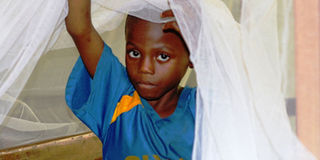Deaths from malaria on decline globally - report

A young boy gets out of a mosquito net. Sleeping under a long lasting insecticide-treated net every night prevents malaria. file photo
What you need to know:
There has been a scaling up of diagnostic testing, and more people are now able to receive medicines to treat the parasitic infection, which is spread by the bites of infected mosquitoes
Global efforts have significantly reduced the number of people dying from malaria, the World Health Organisation (WHO) says in a new report. The World Malaria Report shows between 2001 and 2013, 4.3m deaths were averted, 3.9m of which were children under the age of five in sub-Saharan Africa.
“Each year, more people are being reached with life-saving malaria interventions. In 2004, three per cent of those at risk had access to mosquito nets, but now 50 per cent do,” WHO said in the report.
Winning the fight
There has been a scaling up of diagnostic testing, and more people are now able to receive medicines to treat the parasitic infection, which is spread by the bites of infected mosquitoes.
WHO says the number of countries moving towards malaria elimination is also increasing.
In Africa, where 90 per cent of all malaria deaths occur, the number of people infected has fallen by a quarter from 173m in 2000 to 128m in 2013.
Margaret Chan, the director general, WHO said: “These tremendous achievements are the result of improved tools, increased political commitment, and a major increase in international and domestic financing.”
She added: “We must not be complacent. Most malaria-endemic countries are still far from achieving universal coverage with life-saving malaria interventions.”
Drug resistance
According to the report, emerging drug and insecticide resistance continues to pose a major threat, and if left unaddressed could trigger an upsurge in deaths.
“The next few years are going to be critical to show that we can maintain momentum and build on the gains,” says Dr Pedro Alonso, the director for WHO’s global malaria programme.
The report says insecticide treated nets, a key intervention for malaria prevention remains inaccessible to many people especially in sub Saharan Africa. Progress has also been slow in ensuring access to preventive therapies for pregnant women and children under the age of five.
Access to artemisinin-based combination therapies (ACTs) to treat malaria is on the increase, although millions of people continue to lack access to diagnosis and quality-assured treatment, particularly in countries with weak health systems.
“Against a backdrop of continued insufficient funding, the fight against malaria needs a renewed focus to ensure maximum value for money,” says Fatoumata Nafo-Traore, the executive director of the Roll Back Malaria Partnership.
Uganda is one of several malaria endemic countries in the world with the disease taking the lives of about 300 people, especially children and pregnant women every day.
Although the mosquito-borne disease is easily curable if detected on time and medication made available, it continues to pose a great public health challenge to the country




